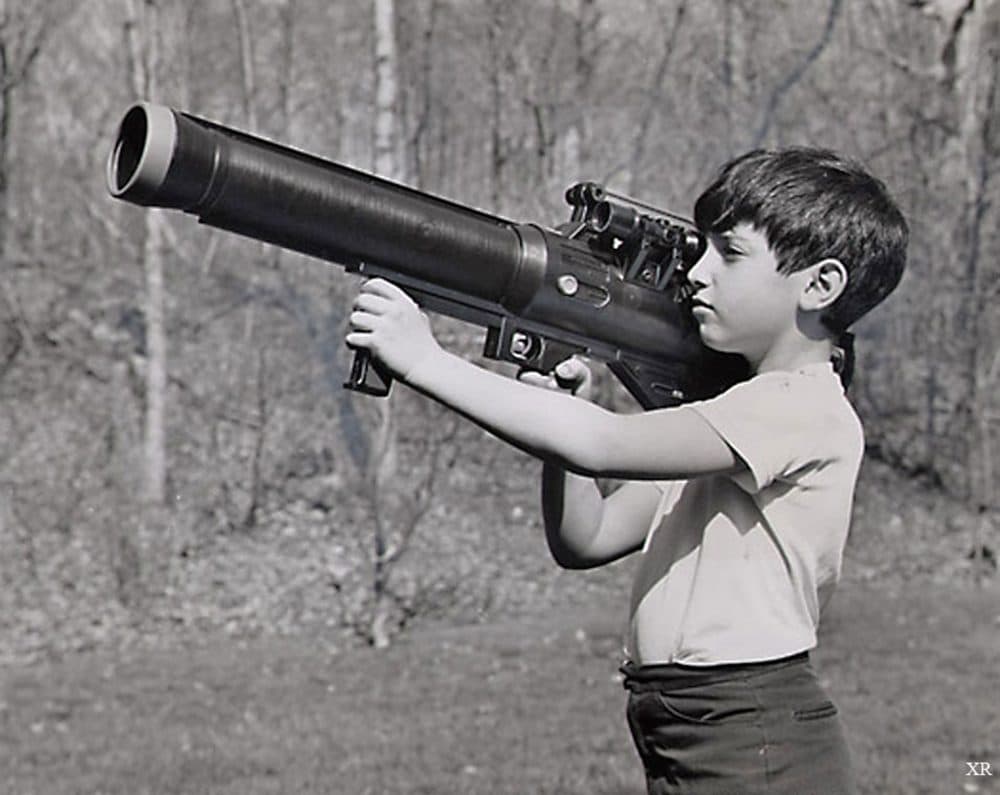Advertisement
Toys Will Be Toys? The Trouble With Toy Guns

Too often, I’ve overheard my neighbors’ 5- and 6-year-olds play war games and seen them brandish black plastic assault guns. “Incoming!” one boy calls out, pointing the fake weapon into the air.
Their gun-play upsets me, but when I share my concern with the men in my neighborhood, they tell me, "Boys will be boys," and, “I played shoot-em-up games as a kid and turned out OK.”
And I must admit that I used to give my grandsons pink plastic squirt guns on hot summer days, despite my son and daughter-in-law's ban on gun-play at home. The word “gun” was even verboten, along with “stupid” and “fat.” The 3- and 5-year-olds would grab pistols from our toy box, run outside and hide behind trees so they could leap out to shoot each other with sprays of water. Then they’d go back home and confess: “We played shooting games today! Gramma gave us the guns.”
My grandsons are oblivious to their white privilege, which starts with the freedom as kids to brandish fake weapons and pretend to kill each other, with no dire consequences.
I knew that their guns wouldn’t be mistaken for real: My grandsons are oblivious to their white privilege, which starts with the freedom as kids to brandish fake weapons and pretend to kill each other, with no dire consequences.
I did try hard to interest them in alternative squirt gun fun, like vying to make the highest wet spot on a tree trunk. They’d go along with my suggestions, but as soon as I'd turned my back, I’d hear, “Bam! Bam! Gotcha!”
Still, I didn’t throw out those toy guns as their parents would have liked. Nostalgia got in the way. You see, I’ve kept a real weapon hidden in my closet for decades: a 22 Winchester rifle that my father gave me on my 14th birthday. He set up a tree stump a few yards from our rural Pennsylvania home, where I’d prop my elbow, hold my breath, and aim at the cardboard target on the tree across the cornfield, above the blueberries. I vividly recall that concentration, suspended breath, and slow finger squeeze.
Dad also took me quail and grouse hunting, at least until my sneezing from hay fever ruined the silence needed on such forays.
For my father, a gun had been an essential when he was a child, especially after his father died. Without one to kill livestock and game birds for meat, a job he started at age 11, his mother and siblings would have had an even harder time of it. A gun meant food, money and survival.
Advertisement
It's clear: My grandsons' world is not the same as my father's or mine. At the megastore where I went to replace my grandsons’ broken squirt guns, I found only a make-believe but fierce-looking double-action shotgun, a black plastic Uzi that could pass for a real one, and a faux hand grenade. These look too much like the high-power weapons two teenagers used to murder 13 children and adults at Columbine High School, and a 20-year-old used to murder 20 first-graders and six educators at Sandy Hook Elementary School.
So I am increasingly bothered by war weaponry, fun or faux.
Yes, boys will be boys. But if they can learn not to call people fat or ugly, they can learn to have fun in ways other than with war games.
...if they can learn not to call people fat or ugly, they can learn to have fun in ways other than with war games.
But first, adults have to do what’s right. So this week, I called my Cambridge police station and had them take away my beloved Winchester. As I hefted it from the closet where I’d kept it since the 1970s, I was surprised at how much it weighed.
Once it was gone, I felt unburdened. I told my neighbors' boys, “I don’t like war games.”
“I don’t like war, either, but it’s just pretend,” one replied.
“Do you want to be a soldier when you grow up?” I asked.
“No,” he said. “A soldier has to shoot people. I want to be a policeman who doesn’t have to shoot people. Policemen mostly rescue people.”
Let’s hope that will be reliably so, by the time he grows up.
